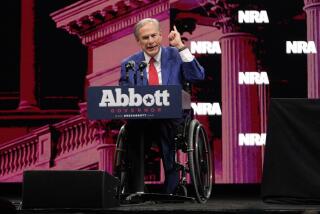Parole Rejected for Ray in King Assassination
- Share via
NASHVILLE — James Earl Ray lost his bid for freedom Wednesday when a parole board rejected claims that he did not kill Dr. Martin Luther King Jr. and that he was pressured into pleading guilty.
At his first parole hearing in 25 years, Ray claimed his lawyer convinced him that he already had been convicted by the news media and that pleading guilty in return for 99 years in prison was better than risking a trial and possible death sentence.
“First, I didn’t kill Dr. King,” Ray said. “I wasn’t involved in any type of collusive activity.”
King was slain on April 4, 1968, as he stood on a motel balcony in Memphis, where he had come to back striking sanitation workers.
“You had a choice,” Tennessee Board of Paroles member Rose Hill said of the plea. “I did not have a choice,” Ray replied.
King’s slaying sparked riots in more than 100 cities and set off one of the largest searches in U.S. history before Ray was captured in London. Ray was returned to Memphis, where he pleaded guilty. Three days later, he recanted.
More to Read
Sign up for Essential California
The most important California stories and recommendations in your inbox every morning.
You may occasionally receive promotional content from the Los Angeles Times.













